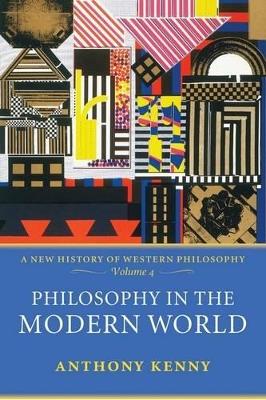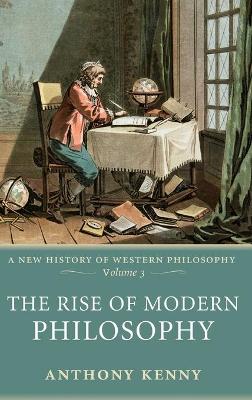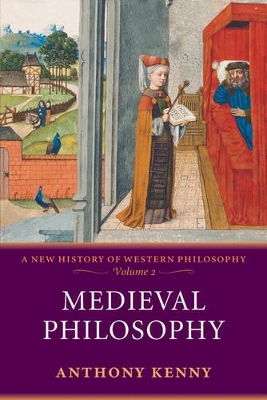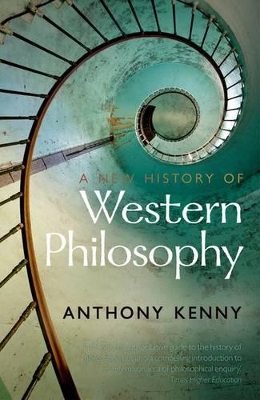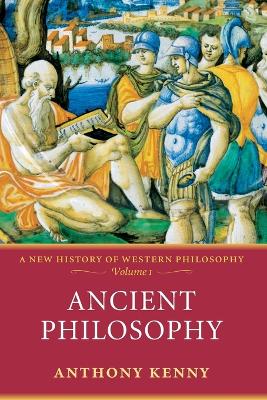New History of Western Philosophy
5 total works
Sir Anthony Kenny tells the fascinating story of the development of philosophy in the modern world, from the early nineteenth century to the late twentieth century. Alongside (and intertwined with) extraordinary scientific advances, cultural changes, and political upheavals, the last two centuries have seen some of the most intriguing and original developments in philosophical thinking, which have transformed our understanding of ourselves and our world. In the first
part of the book Kenny offers a lively narrative introducing the major thinkers in their historical context. He then proceeds to guide the reader lucidly through the nine main areas of philosophical work in the period, offering a serious engagement with the ideas and arguments. Among those we meet
are the great figures of continental European philosophy, from Schopenhauer, Kierkegaard, and Nietzsche to Heidegger and Sartre; the Pragmatists who first developed a distinctively American philosophical tradition; Marx, Darwin, and Freud, the non-philosophers whose influence on philosophy was immense; Wittgenstein and Russell, friends and colleagues who set the agenda for analytic philosophy in the twentieth century.
Philosophy in the Modern World brings to completion Kenny's magisterial New History of Western Philosophy. The four volumes have been designed to dovetail with each other: they offer a unified overview of the entire development of philosophy, allowing readers to trace themes through the centuries, from antiquity to the present day. The story is illuminated by a selection of intriguing and beautiful illustrations.
part of the book Kenny offers a lively narrative introducing the major thinkers in their historical context. He then proceeds to guide the reader lucidly through the nine main areas of philosophical work in the period, offering a serious engagement with the ideas and arguments. Among those we meet
are the great figures of continental European philosophy, from Schopenhauer, Kierkegaard, and Nietzsche to Heidegger and Sartre; the Pragmatists who first developed a distinctively American philosophical tradition; Marx, Darwin, and Freud, the non-philosophers whose influence on philosophy was immense; Wittgenstein and Russell, friends and colleagues who set the agenda for analytic philosophy in the twentieth century.
Philosophy in the Modern World brings to completion Kenny's magisterial New History of Western Philosophy. The four volumes have been designed to dovetail with each other: they offer a unified overview of the entire development of philosophy, allowing readers to trace themes through the centuries, from antiquity to the present day. The story is illuminated by a selection of intriguing and beautiful illustrations.
Sir Anthony Kenny's engaging new history of Western philosophy now advances into the modern era. The Rise of Modern Philosophy is the fascinating story of the emergence, from the early sixteenth to the early nineteenth century, of great ideas and intellectual systems that shaped modern thought. Kenny introduces us to some of the world's most original and influential thinkers, and shows us the way to an understanding of their famous works. The thinkers we
meet include Rene Descartes, traditionally seen as the founder of modern philosophy; the great British philosophers Hobbes, Locke, and Hume; and the towering figure of Immanuel Kant, who perhaps more than any other made philosophy what it is today.
In the first three chapters Kenny tells the story chronologically: his lively accessible narrative brings the philosophers to life and fills in the historical and intellectual background to their work. It is ideal as the first thing to read for someone new to the history of modern philosophy. In the seven chapters that follow Kenny looks closely at each of the main areas of philosophical exploration in this period: knowledge and understanding; the nature of the physical universe; metaphysics
(the most fundamental questions there are about existence); mind and soul; the nature and content of morality; political philosophy; and God.
A selection of intriguing and beautiful illustrations offer a vivid evocation of the human and social side of philosophy. Anyone who is interested in how our understanding of ourselves and our world developed will find this a book a pleasure to read.
meet include Rene Descartes, traditionally seen as the founder of modern philosophy; the great British philosophers Hobbes, Locke, and Hume; and the towering figure of Immanuel Kant, who perhaps more than any other made philosophy what it is today.
In the first three chapters Kenny tells the story chronologically: his lively accessible narrative brings the philosophers to life and fills in the historical and intellectual background to their work. It is ideal as the first thing to read for someone new to the history of modern philosophy. In the seven chapters that follow Kenny looks closely at each of the main areas of philosophical exploration in this period: knowledge and understanding; the nature of the physical universe; metaphysics
(the most fundamental questions there are about existence); mind and soul; the nature and content of morality; political philosophy; and God.
A selection of intriguing and beautiful illustrations offer a vivid evocation of the human and social side of philosophy. Anyone who is interested in how our understanding of ourselves and our world developed will find this a book a pleasure to read.
Sir Anthony Kenny continues his magisterial new history of Western philosophy with a fascinating guide through more than a millennium of thought from 400 AD onwards, charting the story of philosophy from the founders of Christian and Islamic thought through to the Renaissance.The middle ages saw a great flourishing of philosophy, and the intellectual endeavour of the era reaches its climax in the thirteenth and fourteenth centuries, with the systems of the great
schoolmen such as Thomas Aquinas and John Duns Scotus.
Specially written for a broad popular readership, but serious and deep enough to offer a genuine understanding of the great philosophers, Kenny's lucid and stimulating history will become the definitive work for anyone interested in the people and ideas that shaped the course of Western thought.
schoolmen such as Thomas Aquinas and John Duns Scotus.
Specially written for a broad popular readership, but serious and deep enough to offer a genuine understanding of the great philosophers, Kenny's lucid and stimulating history will become the definitive work for anyone interested in the people and ideas that shaped the course of Western thought.
This book is no less than a guide to the whole of Western philosophy-the ideas that have undergirded our civilization for two-and-a-half thousand years. Anthony Kenny tells the story of philosophy from ancient Greece through the Middle Ages and the Enlightenment into the modern world. He introduces us to the great thinkers and their ideas, starting with Plato, Aristotle, and the other founders of Western thought. In the second part of the book he takes us through a
thousand years of medieval philosophy, and shows us the rich intellectual legacy of Christian thinkers like Augustine, Aquinas, and Ockham. Moving into the early modern period, we explore the great works of Descartes, Hobbes, Locke, Leibniz, Spinoza, Hume, and Kant, which remain essential reading
today. In the nineteenth and twentieth centuries, Hegel, Mill, Nietzsche, Freud, and Wittgenstein again transformed the way we see the world.
Running though the book are certain themes which have been constant concerns of philosophy since its early beginnings: the fundamental questions of what exists and how we can know about it; the nature of humanity, the mind, truth, and meaning; the place of God in the universe; how we should live and how society should be ordered. Anthony Kenny traces the development of these themes through the centuries: we see how the questions asked and answers offered by the great philosophers of the past
remain vividly alive today.
Anyone interested in ideas and their history will find this a fascinating and stimulating read.
thousand years of medieval philosophy, and shows us the rich intellectual legacy of Christian thinkers like Augustine, Aquinas, and Ockham. Moving into the early modern period, we explore the great works of Descartes, Hobbes, Locke, Leibniz, Spinoza, Hume, and Kant, which remain essential reading
today. In the nineteenth and twentieth centuries, Hegel, Mill, Nietzsche, Freud, and Wittgenstein again transformed the way we see the world.
Running though the book are certain themes which have been constant concerns of philosophy since its early beginnings: the fundamental questions of what exists and how we can know about it; the nature of humanity, the mind, truth, and meaning; the place of God in the universe; how we should live and how society should be ordered. Anthony Kenny traces the development of these themes through the centuries: we see how the questions asked and answers offered by the great philosophers of the past
remain vividly alive today.
Anyone interested in ideas and their history will find this a fascinating and stimulating read.
Sir Anthony Kenny tells the fascinating story of the birth of philosophy and its remarkable flourishing in the ancient Mediterranean world. This is the first of four volumes in which he unfolds a magisterial new history of Western philosophy. Specially written for a broad popular readership, but serious and deep enough to offer a genuine understanding of the great philosophers, Kenny's lucid and stimulating history will become the definitive work for anyone
interested in the people and ideas that shaped the course of Western thought.
interested in the people and ideas that shaped the course of Western thought.
